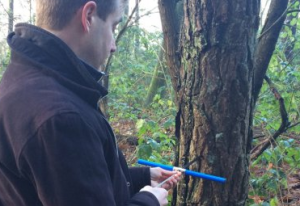 Gert-Jan Nabuurs described this vision upon taking up the post of Professor (by special appointment) of European Forest Resources at Wageningen University on 12 February.
Gert-Jan Nabuurs described this vision upon taking up the post of Professor (by special appointment) of European Forest Resources at Wageningen University on 12 February.
Inauguration of prof. Gert-Jan Nabuurs
The greening of the economy will lead to an increase in demand for wood as a raw material. At the same time, and as a separate development, the pressure on forests is increasing, for example due to climate change. Professor Nabuurs will concentrate in his research on the strategic analysis of future changes in forests as a result of developments in market demand and environmental conditions. As Professor Nabuurs explained in his inaugural address ‘The future of European forests’, sustainable forestry management in Europe is also very important for the Netherlands, as a major importer of European wood.
Biodiversity
Almost 40% of Europe’s land area is covered by forest. This forest not only plays an important role in the quality of the living environment, but also in regulating the carbon and water cycles, for example, as well as biodiversity and – of course – wood production. However, forests in the Netherlands and other countries are becoming older and their biodiversity is declining. Furthermore, there is little attention paid to good forestry management. “Knowledge about forests is insufficient and forestry ownership fragmented,” said Professor Nabuurs. “By investing in proper management and policy, it is possible to ensure both biodiversity protection and the production of raw materials and improved employment opportunities in the rural areas of Europe.”
“My research will focus on the future development of European forests. We will model forest dynamics and forestry management and monitor the health of forests throughout Europe,” explained Professor Nabuurs. “This will provide an understanding of the long-term effects, for example on the functions of forests and on wood production, as well as on nature conservation and CO2 fixation.”
Expanding and scaling up the research by conducting European scenario studies will make it possible to place forestry research in a broader perspective, and to apply the results in multifunctional forestry management. It will also provide insight into the opportunities, limitations and relevance of national and international forestry management practises, and contribute to Dutch and European forestry management and nature conservation. Professor Gert-Jan Nabuurs will therefore work on broadening and linking current developments in Europe, in response to the increasing interest in forests and forest use.
This professorship by special appointment is funded by Alterra and is part of the Forest Ecology and Forestry Management Group at Wageningen University. Nabuurs is also a Lead Scientist European forest resources at Alterra Wageningen UR. He carries out his work in partnership with institutes throughout Europe and with various Wageningen UR chair groups, including Forest and Nature Conservation Policy. He has led various European research projects, was Assistant Director of the European Forest Institute in Finland between 2009 and 2012, is an IPCC lead author and is currently also active in the UNECE Timber Committee. He has also advised the European Commission on forestry policy.
Contact
prof.dr.ir. GJMM (Gert-Jan) Nabuurs
Author
Prof. Dr. Gert-Jan Nabuurs
Source
Wageningen UR, press release, 2015-02-18.
Supplier
European Commission
European Forest Institute (EFI)
Forestry and Timber - UNECE
Intergovernmental Panel on Climate Change (IPCC)
Wageningen University
Share
Renewable Carbon News – Daily Newsletter
Subscribe to our daily email newsletter – the world's leading newsletter on renewable materials and chemicals









